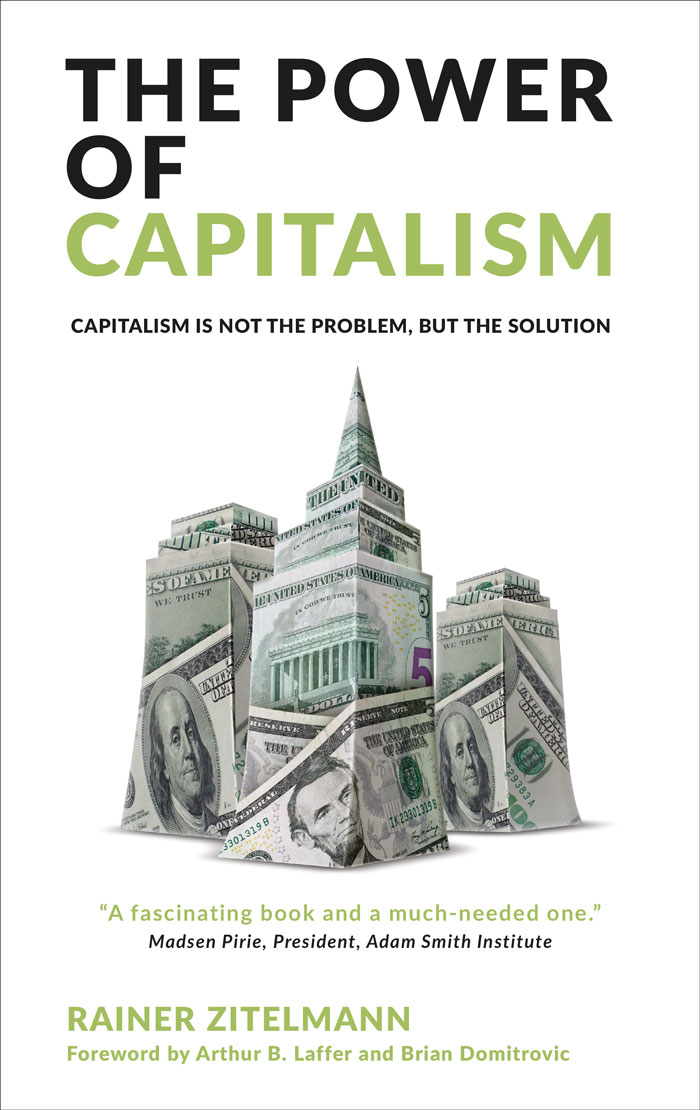Foreword by Arthur B. Laffer and
Brian Domitrovic
Capitalism is a success story, as became especially clear aft er the collapse of socialist systems. As the entrepreneurs and managers of the great businesses have gotten rich, the greater part of the population has prospered as well. In 1981, the absolute poverty rate globally was 42.7 percent; by 2000, it had fallen to 27.8 percent, and in 2023 it was below 9 percent.
The author of this book, the holder of doctorates in history and sociology, observes what happens when the state increasingly interferes in the economy – and what happens when the market economy is allowed to develop more freely.
In the first chapter of this book, he impressively details the suffering that socialism brought to China under Mao. Zitelmann lectures on this subject all over the world – in Asia, Latin America, Europe and the US, and in 2022 and 2023 alone he travelled to 30 countries. We met him at FreedomFest in the United States, where he told us that in every one of his talks, he always asks one question: “Who in the audience heard anything in school or college about the greatest socialist experiment in human history, Mao’s ‘Great Leap Forward’ in the late 1950s?” And invariably very few people, often not a single one, come forward – in spite of the fact that 45 million people in China died as a result of the “Great Leap Forward.” In schools, students hear a lot about the alleged evils of capitalism, but little about the failures of socialism.
So many variations of socialism have been tried – in the Soviet Union it was different from China, in Yugoslavia it was different from North Korea, in East Germany it was different from Poland – but nowhere has it worked. In the original form of socialism, enterprises were nationalised in line with Karl Marx’s teachings. However, modern socialism works differently: Formally, property owners remain property owners, but they are gradually stripped of control over their assets as the state increasingly determines what they are allowed or required to do with their property.
It is no longer companies or consumers who decide what is produced, but politicians and civil servants. This is underpinned by the belief that, when it comes to what is good for people, politicians know better than millions of consumers and entrepreneurs. And this is precisely the difference between a market economy and a planned economy: In a market economy, every day, millions of producers and consumers decide what is and is not made and sold. Prices send a signal to companies as to what products are needed – and how many – and which are not.
It doesn’t take “pure capitalism” to dramatically improve people’s living standards; even a little capitalism can help a lot. Zitelmann shows how the introduction of private property and free-market reforms reduced the proportion of the Chinese population living in extreme poverty from 88 percent in 1981 to less than one percent today. Rarely have I read such a clear analysis of developments in China. But he also warns that the trend in China in recent years has reversed: more state and less market.
Unfortunately, this is not only the case in China, but also in the US, Europe and Latin America. Everywhere you look, countries are once again moving in the direction of more state and less market. That is why this book is so important. Zitelmann shows that aft er a certain amount of time has passed, people always forget the reason for their prosperity, namely capitalism. He admires politicians like Ronald Reagan and Margaret Thatcher, who had the courage to cut taxes, privatise and deregulate.
The chapter on Reagan was of particular interest to me (Arthur Laffer) because I knew Reagan well and was privileged to advise him on economic policy. Reagan took the top rate of the income tax in the United States down from 70 percent to 28 percent. No wonder we had a boom!
We need politicians like Reagan and Thatcher again today. For them to succeed, it would be helpful to have a change in the intellectual realm, in the realm of ideas. A most interesting chapter in this book, in my view, is the Chapter 10 on why intellectuals dislike capitalism. Here Zitelmann shows why anti-capitalism is the mother’s milk of intellectuals. Not of all intellectuals, of course. Th ere are exceptions, such as Thomas Sowell, Ludwig von Mises, Friedrich August von Hayek, and Rainer Zitelmann.
Zitelmann’s talent lies in presenting complex issues in simple terms – scientifically, but without scientific jargon. That is one of the reasons why his books have been translated into over 30 languages. At FreedomFest 2022, his film Life behind the Berlin Wall won an award, and it is well worth watching on YouTube (it has since been viewed 310,000 times). The film is based on the third chapter of this book. We would like to see the other chapters turned into films too, as this would help bring the important messages of this book to as wide an audience as possible.
Arthur B. Laffer, Ph.D. is the economist who helped inspire the global tax-cut revolution of the 1970s and 1980s. In 2019, President Donald Trump awarded him the Presidential Medal of Freedom.
Brian Domitrovic, a historian of supply-side economics, is co-author with Arthur Laffer (and Jeanne Sinquefield) of Taxes Have Consequences: An Income Tax History of the United States (2022).

Order online
secure and easy at: